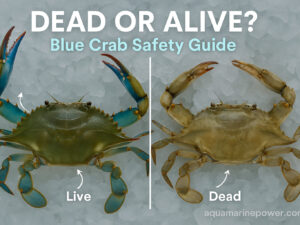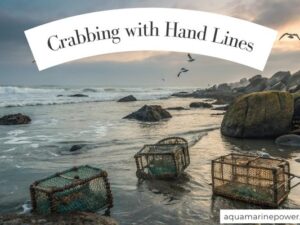Whether you're planning to catch blue crabs in the Delaware Bay or from the shore, you'll need a Delaware crabbing license before dropping your first pot. The good news is that obtaining one is straightforward and affordable. A Delaware fishing license, which covers crabbing, costs just $8.50 for residents and $20 for non-residents annually.
This license is your all-access pass to Delaware's abundant waters, covering fishing, crabbing, and clamming throughout the state. Unlike some states that require separate permits for each activity, Delaware keeps it simple with one comprehensive license.
In this guide, we'll walk you through everything you need to know about getting your Delaware crabbing license, from online purchase options to understanding the regulations that keep our crab populations thriving.
Delaware Crabbing License Requirements for 2025
Who Needs a Delaware Crabbing License?
Anyone aged 16 or older must have a valid Delaware fishing license to crab in any state waters. This requirement applies to both residents and non-residents, with no exceptions based on where you're from. Delaware does not have reciprocity agreements with neighboring states, meaning licenses from Maryland, New Jersey, or Pennsylvania won't cover you here.
The state defines residents as those who have lived in Delaware for at least 30 consecutive days. Non-residents include anyone visiting from out of state or those who haven't met the residency requirement. This distinction is important because it affects your license fee.
If you're planning to crab from a boat, you might consider a boat fishing license instead, which covers all passengers aboard your vessel.
Delaware Fishing License for Seniors
Good news for senior crabbers! Delaware residents aged 65 and older are completely exempt from purchasing a fishing license. This exemption applies automatically once you reach 65, and there's no special senior license to apply for.
However, seniors must still carry proof of age and Delaware residency while crabbing. A valid Delaware driver's license or state ID works perfectly for this purpose.
Even though the license is free for seniors, they still need to obtain a FIN number through the Digital DNREC system to comply with federal fishing regulations.
FIN Number Requirements
The Fisherman Information Network (FIN) number is a federal requirement for all anglers aged 16 and older. This free number helps wildlife agencies track fishing participation and manage fish populations effectively. When you buy a Delaware fishing license online, your FIN number is automatically generated and linked to your license.
If you're exempt from licensing requirements (like seniors or disabled veterans), you'll need to apply for a standalone FIN number through Digital DNREC. The process takes just a few minutes and costs nothing.
Remember to keep your FIN number with your license while crabbing, as conservation officers may ask to see both during compliance checks.
Delaware Fishing License Purchase Online: Step-by-Step Guide
Digital DNREC System Overview
The Digital DNREC ePermitting system is Delaware's official platform for purchasing fishing licenses online. This user-friendly system replaced the old paper-based process, making it easier than ever to get licensed from your computer or smartphone.
Creating an account takes about five minutes and provides several benefits. You'll have instant access to your license history, can easily renew each year, and can reprint licenses if you lose the original.
Before starting, gather your driver's license, Social Security number, and payment information to streamline the process.
Delaware Fishing License Log In Process
To access your existing account, visit the Digital DNREC website and click the "Log In" button in the upper right corner. Enter your username and password to access your dashboard, where you'll see your license history and renewal options.
Forgot your login credentials? Click the "Forgot Username" or "Forgot Password" links on the login page. The system will email you instructions to reset your information using the email address associated with your account.
For security, the system automatically logs you out after 30 minutes of inactivity, so don't worry if you need to sign back in during longer sessions.
How to Buy Delaware Fishing License Online?
Ready to purchase your Delaware fishing license online? Start by logging into your Digital DNREC account or creating a new one. From your dashboard, select "Purchase New License" and choose "Recreational Fishing License" from the dropdown menu.
The system will guide you through several screens where you'll confirm your residency status, select your license type, and review your information. For those interested in saltwater fishing, the same license covers both fresh and saltwater activities.
Payment is processed securely through the state's payment gateway, accepting all major credit cards and debit cards. Once complete, you'll receive an email confirmation with a PDF of your license attached. Print it immediately or save it to your phone for easy access while crabbing.
Delaware Crabbing License Costs & Options
Individual License Fees
Understanding the fee structure helps you choose the right license for your needs. Here's a breakdown of current costs:
| License Type | Resident | Non-Resident |
|---|---|---|
| Annual Fishing License | $8.50 | $20.00 |
| 7-Day Tourist | N/A | $12.50 |
| Boat License (≤20 ft) | $40.00 | $40.00 |
| Boat License (>20 ft) | $50.00 | $50.00 |
The annual license runs from January 1 through December 31, regardless of when you purchase it. There's no prorating for licenses bought later in the year, so consider timing your purchase accordingly.
For occasional crabbers visiting Delaware, the 7-day tourist license offers great value, especially for summer vacation trips to the coast.
Delaware Boat Fishing License Online Options
A Delaware boat fishing license online purchase might be your best option if you own a boat. This special license covers everyone aboard your vessel while fishing or crabbing, eliminating the need for individual licenses for each passenger.
The boat license is particularly cost-effective for families or groups who frequently crab together. Boats 20 feet or shorter qualify for the lower fee, while larger vessels pay slightly more.
Resident boat license holders receive a bonus – a complimentary individual fishing license for use when not on their boat. This dual coverage ensures you're legal whether crabbing from your boat, a pier, or the shoreline.
Commercial vs Recreational Licenses
While our focus is recreational crabbing, it's important to understand the distinction from commercial operations. Recreational licenses limit you to personal-use quantities and specific gear restrictions.
Charter boat operators need a commercial charter license ($150 for residents, $300 for non-residents), which covers paying customers but not the captain or crew. Head boats that charge per person require an even more comprehensive license.
If you're just crabbing for dinner with family and friends, the standard recreational license is all you need. Commercial licenses only become necessary when money changes hands for fishing services.
State of Delaware Crabbing License Regulations
Legal Crabbing Gear & Limits
Delaware state fishing license requirements include strict regulations on crabbing gear to ensure sustainable harvests. Recreational crabbers may use a maximum of two crab pots per person, and the license holder must personally set and tend their pots.
Beyond pots, you're allowed unlimited hand lines and one trot line of any length. Many successful crabbers prefer trot lines in tidal areas where currents help attract crabs to the bait.
The daily catch limit is one bushel per person, measured in a standard bushel basket. This generous limit provides plenty of crabs for a family feast while protecting the population for future generations.
Blue Crab Size & Species Requirements
Delaware's blue crab regulations protect breeding populations while allowing sustainable harvest. Hard-shell crabs must measure at least 5 inches from point to point across the shell. Conservation officers carry measuring devices and check catches regularly.
Mature female crabs, called "sooks," are identified by their rounded apron on the underside. These can be kept at any size once they reach maturity, recognizing that females stop growing after their final molt.
Egg-bearing females, known as "sponge crabs" due to the orange egg mass beneath their apron, must be returned to the water immediately. Harvesting these crabs could impact millions of potential offspring.
Crab Pot Marking Requirements
Proper pot marking prevents gear conflicts and helps conservation officers identify owners. All recreational crab pots must display white buoys marked with the owner's full name and permanent mailing address. The information must be legible and permanently affixed – either painted directly on the buoy or attached with a waterproof tag.
The 72-hour tending requirement prevents ghost pots from continuing to trap crabs indefinitely. Set a reminder on your phone to check pots within this timeframe, as abandoned gear can result in fines.
From December 1 through February 28, all pots must be removed from the water for winter. This closure protects crabs during their dormant period and prevents ice damage to gear.
Seasonal Restrictions
While Delaware allows crabbing year-round in most areas, understanding seasonal patterns helps maximize success. Spring brings the first wave of crabs moving into shallow waters, with activity increasing through summer.
Peak crabbing typically occurs from July through September when water temperatures reach their highest. During this time, crabs are most active and feeding aggressively.
Some specific areas may have additional closures for conservation purposes. Check the current regulations before heading out, as these can change based on population assessments.
Delaware State Fishing License Requirements & Exemptions
Who's Exempt from License Requirements?
Several groups enjoy exemptions from Delaware fishing license 2025 requirements. Veterans with 60% or higher service-connected disabilities can crab without purchasing a license, though they must carry proof of disability status.
Property owners fishing on their own land need no license if the property exceeds 20 acres. This exemption applies only to the landowner and immediate family members, not guests.
Participants in fee-fishing areas where the operator holds appropriate permits don't need individual licenses. These venues handle licensing through their commercial permits.
Special Circumstances
Children under 16 can crab without a license when accompanied by a licensed adult. This family-friendly policy encourages introducing young people to responsible fishing practices and conservation ethics.
Delaware National Guard members who served honorably for at least 90 consecutive days receive free licenses for 12 months after discharge. This benefit recognizes their service to the state.
Out-of-state visitors should note that even one day of crabbing requires a license. The 7-day tourist option provides flexibility for vacation trips without committing to an annual license.
Where to Purchase Your Delaware Crabbing License?
Online Purchase Options
The Digital DNREC website remains the fastest and most convenient way to buy your Delaware fishing license online. The system operates 24/7, allowing purchases at your convenience without visiting a physical location.
Mobile users appreciate the responsive design that works seamlessly on smartphones and tablets. Save the PDF to your phone's files for offline access, ensuring you have proof of license even without cell service.
Creating an account provides additional benefits like license history tracking and easy renewals. The system sends reminder emails before your license expires, helping you stay compliant year-round.
In-Person Locations
Over 40 authorized agents throughout Delaware sell fishing licenses, including sporting goods stores, marinas, and tackle shops. These locations offer personal service and can answer questions about local crabbing spots.
DNREC headquarters at 89 Kings Highway in Dover houses the main licensing desk. Staff members can assist with complex situations or replace licenses for those without internet access.
When purchasing in person, bring a valid ID and be prepared to provide your Social Security number for the FIN system. Cash, check, and cards are typically accepted, though this varies by location.
License Validity & Renewal
All Delaware fishing licenses expire on December 31, regardless of purchase date. This standardized system simplifies enforcement and helps anglers remember renewal time.
Unlike some states, Delaware doesn't offer automatic renewal. You'll need to actively purchase a new license each year through Digital DNREC or an authorized agent.
Keep digital copies of your license in multiple locations – email, phone, and cloud storage. While officers can look up your license status, having immediate proof speeds up compliance checks and gets you back to crabbing faster.
Pro Tips for Delaware Crabbing Success
Best Crabbing Locations
Delaware offers numerous public access points for productive crabbing. The Indian River Inlet provides excellent opportunities, especially around the bridge pilings during moving tides. For beginners interested in different types of fishing, these areas offer variety beyond just crabbing.
Bowers Beach remains a local favorite, with easy access and consistent catches throughout the season. The shallow waters warm quickly in summer, attracting crabs to feed in the grass beds.
Cape Henlopen State Park's bayside offers protected waters perfect for families. The fishing pier provides easy access without needing a boat, though a surf fishing permit is required for vehicle beach access.
Essential Gear Checklist
Beyond your license, successful crabbing requires proper equipment:
Must-Have Items:
- Crab pots or hand lines
- Bait (chicken necks, fish heads, or razor clams)
- Bushel basket for measuring
- Crab ruler or caliper
- Gloves for handling crabs
- Cooler with ice
- First aid kit
Consider a crab net for scooping crabs when hand-lining, and always bring extra line for repairs. A bucket for bait and a knife for cutting line complete your basic kit.
Common Mistakes to Avoid
New crabbers often place pots in areas with heavy boat traffic, risking gear loss. Scout locations during low tide to identify channels and avoid navigation routes.
Forgetting to check pots within 72 hours results in fines and wasted crabs. Set phone reminders or maintain a logbook noting when and where you set each pot.
Many beginners measure crabs incorrectly, leading to violations. Measure point to point across the widest part of the shell, not including the swimming legs.
Frequently Asked Questions
Can I Use My Delaware Crabbing License in Other States?
No, Delaware fishing licenses are valid only within Delaware waters. Each state maintains its own licensing system without reciprocity agreements. If you plan to crab in Maryland's portion of the Delaware Bay or New Jersey waters, you'll need separate licenses for those states.
Do I Need a Separate License for Crabbing vs Fishing?
Delaware's fishing license is comprehensive, covering all recreational fishing, crabbing, and clamming activities. Unlike some states that require additional stamps or endorsements, one license provides complete coverage for all species except trout, which requires an additional stamp.
What Happens If I Don't Tend My Crab Pots Every 72 Hours?
Failing to tend crab pots within the required timeframe can result in fines starting at $100 per pot. Conservation officers may confiscate abandoned gear, and repeat violations could lead to license suspension. More importantly, untended pots continue catching and killing crabs wastefully.
How Do I Replace a Lost Delaware Fishing License?
Log into your Digital DNREC account to reprint your license anytime at no charge. If you lack internet access, visit any licensing agent or DNREC headquarters with valid ID for a replacement. Keep digital copies on your phone to avoid this situation entirely.
Is There a Delaware Fishing License App for 2025?
While there's no dedicated mobile app, the Digital DNREC website is fully mobile-optimized. Save the website to your home screen for app-like access. Your digital license displays perfectly on smartphones, and officers accept electronic display during compliance checks.
Conclusion
Getting your Delaware crabbing license is the first step toward enjoying the state's abundant blue crab population. At just $8.50 for residents, it's an affordable investment that supports conservation efforts while providing access to fantastic recreational opportunities.
The Digital DNREC system makes purchasing your Delaware fishing license online quick and convenient. Whether you're a seasoned crabber or just starting out, having proper licensing ensures sustainable harvests for future generations.
Don't let another crabbing season pass you by. Purchase your license today through Digital DNREC and join thousands of Delawareans enjoying this time-honored tradition. Remember to review current regulations before each trip, as protecting our marine resources requires everyone's participation.
With your license in hand and knowledge of the regulations, you're ready to experience some of the best crabbing the East Coast has to offer!



